-
Posts
10 -
Joined
-
Last visited
Content Type
Profiles
Forums
Blogs
Posts posted by Gennady Yanayev
-
-
Please change my nation name (Zhonghua Renmin Gongheguo) into Russian SFSR and my flag into Russian flag.
-
We are non-religious, but we stand against tyranny forever... We will send our Minister of Foreign Affairs to attend this prayer.
Zhang Dejiang, President
Zhonghua Renmin Gongheguo
-

Central Government
Zhonghua Renmin Gongheguo
Intervention in Philippines
The People’s Liberation Army of ZRG and New People’s Army of Philippines Communist Party (PCP) succeed to establish a communist government in the central Philippines after won the war against Radical Islamist Rebel led by Abu Sayyaf. The causalities from PLA and NPA are 120 died, 330 wounded and 11 lost and from the Islamist Rebel 300 died, 400 wounded and 210 captured including and Abu Sayyaf. After the war ended, The PKP (Partido Komunista Ng Pilipinas/Philippines Communist Party) and their armed-wing (New People’s Army) declared the establishment of Communist government and then merged into ZRG by using name Philippines Special Autonomous Republic which given many special rights except on military and foreign affairs.

Fernando Alvonso, General Secretary of PKP/De facto leader of Philippines SAR

Alvarez Duterte, President of Philippines SAR
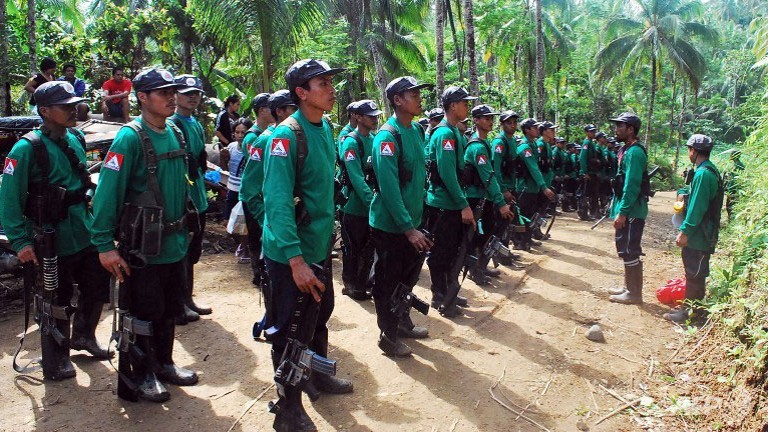
Soldiers of New People's Army prepare to fight against Islamist Radical Group
Raise of Communist in Western Sahara
After a long time war between ethnic groups in Western Sahara, the Arab Socialist Party (which supported and funded by Communist Party of China) led by Muhammad Farah Aidid declared the foundation of communist government in Western Sahara named Democratic Republic of Arab Sahrawi (DRAS) after this declaration the party and government attacked by several radical groups and ethnics group. With the help of People’s Liberation Army and Central Government of ZRG, the communist government saved from dissolution and later merged into ZRG by signing the Treaty of El-Aaiun. The central government of ZRG will give many authorities to the Government of DRAS except in military and foreign relations. The central government also agreed to send 4,000 soldiers to secure and maintain stability in the capital city and build a mega harbor and projects in El Aaiun which will give significant contributions to the local economy.

El Aaiun Business District, The first business district in Western Africa. Funded by Central Government of ZRG.
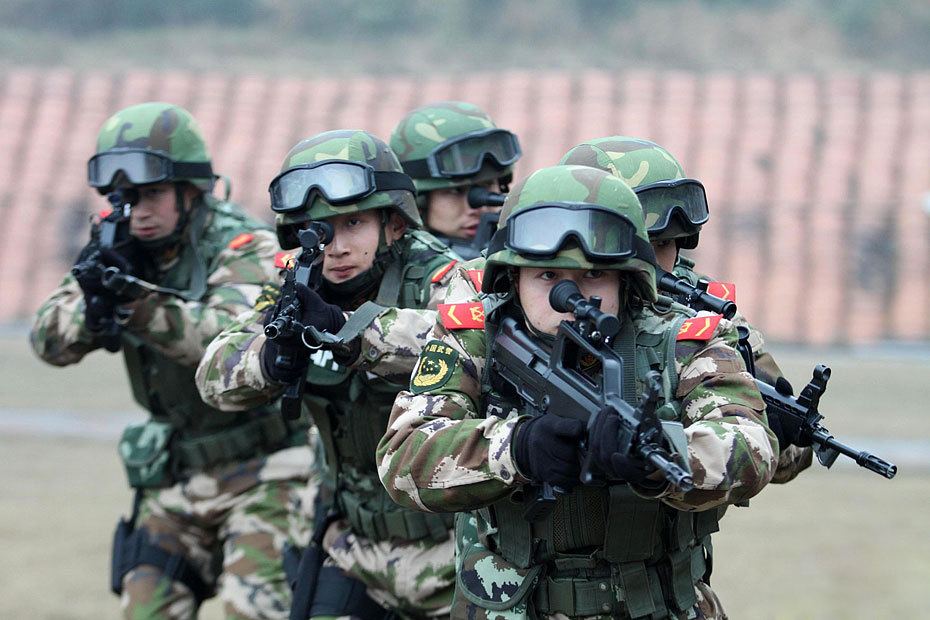
PLA Soldiers in Western Sahara
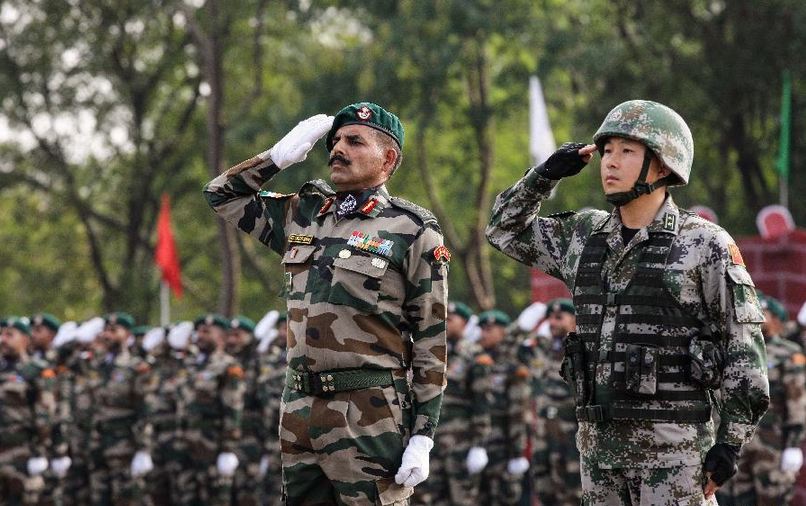
Col. Abdeillah Hasan Zarief, Commander of Western Sahara Liberation Army and Col. Zhao Wenhuan, Commander of Special Operation Forces Command in Africa and Middle East
Creation of Union of Communist Parties
The Communist Party of China, Philippines Communist Party and Arab Socialist Party agreed to create the Union of Communist Party. This union is the place for sharing experience and inspecting the executions of the principle of “One Country, Two System†in the Zhonghua Renmin Gongheguo. The Union of Communist Parties will organize the Joint Conference for every one year and Joint Congress for every five years.
-
Report from
The 18th National Congress of Communist Party of China
The Great Hall of People, Beijing
Zhonghua Renmin Gongheguo
(The People's Republic of China)

The 18th National Congress of Communist Party of China began in Beijing, China, at the Great Hall of People. Due to term and age limits restrictions seven of the nine members of the powerful Politburo Standing Committee (PSC) retired before or during the Congress, including Hu Jintao who was replaced by Zhang Dejiang on Central Committee Conference which held before the congress as General Secretary of Communist Party. The Congress elected the 18th Central Committee of Communist Party of China and saw the number of Politburo Standing Committee reduced from nine to seven.
The seven PSC members elected during the Congress were Zhang Dejiang (elected before the Congress held), Xi Jinping, Li Keqiang, Yu Zhengsheng, Liu Yunshang, Wang Qishan, and Zhang Gaoli.
Some 2,270 delegates selected from the 40 constituencies attended in the Congress. This represented an increase of 59 delegates and two constituencies from the previous Congress. 35 of these constituencies represented province-level jurisdictions. Five other delegations represented People’s Liberation Army, Central Party Organizations, Central Government Ministries and Commissions, State Owned Enterprises, and Central Banks and Financial Institutions.

The Main Congress Arena
Revisions to the Party Constitution
The Congress ratified changes to the Constitution of the Communist Party of China. The Scientific Outlook on Development of the Zhang Dejiang was listed next to Marxism-Leninism, Mao Zedong Thought, Deng Xiaoping Theory and Three Represents as a “guiding ideology of the party, ‘upgraded’ from simply an ideology to merely “follow and implementâ€
The affirmation of Socialism with Chinese Characteristic as a “system†was written into the Party Constitution for the first time. The “construction of ecological civilization†as a major goal of the party was also written in the constitution.
Leadership Changes
The 18th Politburo Standing Committee
Zhang Dejiang
Overall policy framework, foreign affairs, national security, internet and military
Xi Jinping
Government operations, policy implementation, economic reform, climate change
Li Keqiang
Legislation and policy evaluation
Yu Zhengsheng
Civic organizations, ethnic minority affairs, and party organizations
Liu Yunshan
Ideological doctrine and propaganda
Wang Qishan
Internal regulations, party discipline, anti-corruption
Zhang Gaoli
Strategic initiatives, mega projects
New Policies of Zhonghua Renmin Gongheguo
Foreign Affairs:
- Opening diplomacy and establishing relations with other countries
- Increase the influence and role of China in the global politic
- Opening new embassies and consulates in other countries
Military:
- Increase the defense budget to increase the military readiness in case to face threats from internal and external
- Build foreign military base
- Join the global peacekeeping forces
Economy:
- Building economy based on Socialism with Chinese Characteristic
- Establish trade hubs with other countries to increase Export
- Began industrialization especially in Heavy Industries, Automobile Manufacturing, Arms Manufacturing, and Electronic.
- Began mechanization in agriculture and farming sector
- Increase the government budget into business subsidization
National Policy
Declare War against Corruption.
Reported by
CHINA DAILY
The National English Newspaper of China
-
 1
1
-
-
I want to claim the southern part of Western Sahara and the remaining Philippines
-
Official statement from Central Government of Zhonghua Renmin Gongheguo (The People's Republic of China):
Firstly, we would like to recognize the sovereignty and legitimation of the people, and territory of south indian in the hand of the People's Republic of South Indian Union. We also want to establish relations between our country in economy, military and politic. We will give the detail of our diplomatic proposals soon.
Signed,
Minister of Foreign Affairs
Zhonghua Renmin Gongheguo
-
 1
1
-
-
Declaration of Existence
Zhonghua Renmin Gongheguo
(The People’s Republic of China)

Central Government
Zhonghua Renmin Gongheguo
We the government of Zhonghua Renmin Gongheguo (The People’s Republic of China), in order to provide protection and security for all people, to ensure the rights of the empowered individual, humanity as a whole, and to provide prosperity and welfare to our people; and to meet the challenges of global and local problems, do hereby Declare Our Existent and Sovereignty.
We also realized that to reaching our goals and to survive in this world, we have to join and respect to the international society and community. We always open to establish relations between our countries. Hopefully, we could have a strong tie in economy, diplomacy and politics.
President / General Secretary,
Zhang Dejiang
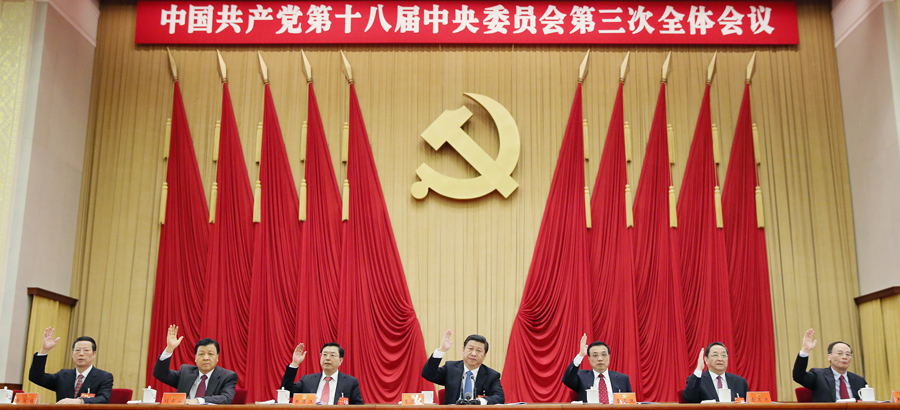
High officials of Zhonghua Renmin Gongheguo (The People’s Republic of China) from left to right:
1. Zhou Enlay, Chairman of National People’s Congress / Chairman of Presidium of National People’s Congress
2. Xi Jinping, Premier of State Council
3. Li Keqiang, Minister of Foreign Affairs / 1st Vice Premier
4. Zhang Dejiang, President / General Secretary of Communist Party / Chairman of Central Military Commission
5. Fang Weichuan, Minister of Internal Affairs
6. Wei Lijiang, Minister of State Security
7. Hu Lihao, Secretary-General of State Council
-
Hello,
Global Leaders,
I, the Paramount Leader of Zhonghua Renmin Gongheguo (in english: The People's Republic of China) would like to introduce myself, my country and my people to the global society. Hopefully, i accepted to join in this great society.
-
APPLICATION
Official nation name: Zhonghua Renmin Gongheguo (The People's Republic of China)
Population (P&W numbers): 74,838
GDP per capita (P&W numbers): $592,5
Population density (sq. km): 71,96
Form of Government: Communist Republic
Politics & War Wikia link (leave blank if you don't have one):
Describe your Nation IC: An unitary sovereign nation in Asia, governed by Communist Party of China based on Socialism with chinese characteristic and centralized democracy.
Describe yourself in OOC terms: A young chinese who loves to roleplaying, loyal and able to cooperate with others.
Have you read, and do you agree to abide with, the rules? (Yes/No): Yes
(You must not have a history of continuous rule breaks in the national affairs subforum!)
Where on the map do you want to be located? (Using real-world geography/nations, or a self-provided map): 50 provinces of Russian siberia.
Nation flag link (if you have a specific one you want to be used): Flag of PRC
(Map-wise, you're limited to a maximum of 50 provinces. If you go higher than that, I'll personally adjust it down until it's at 50, or ask you to re-do your own example until it fits within the 50 province limit. Note that expansion is allowed, but at a maximum of two provinces per month as to be as realistic as possible. This rule applies to nations under 50 provinces as well. Provinces are unable to be moved from one location to another. Gifted land is also capped at two provinces per month. Land gained by a nation as a result of war can be more than this.)
(You are required to post at least once a month in the national affairs subforum to remain active. This means creating your own topic, not just commenting in someone else's posts. Inactive nations will be removed from the map.)


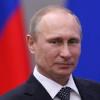
Establishment of Russian SFSR
in National Affairs
Posted
Establishment of Russian Soviet Federative Socialist Republics
The Communist Party of Russia and Communist Party of China were signed the Treaty on the Creation of Russian SFSR which merged the sovereignty of Zhonghua Renmin Gongheguo and its autonomous territories to the Russian SFSR and Communist Party of Russian SFSR. Following this treaty the Communist Parties and Governments of Russia, ZRG, Western Sahara, and Philippines fused into the Communist Party of Russian SFSR and the Central People’s Government of Russian SFSR.
The Central People’s Government composed by:
1. Supreme Soviet (Legislative)
2. Executive Council (Executive)
3. Supreme Court (Judicial)
With the principle of Distribution of power, the sovereignty is on the hand of the people of Russian SFSR without determination based on ethnics and executed by the Communist Party as the representative of People’s Power.
The main directions of the Communist Party are:
1. Marxist-Leninist
2. New Socialism (a theory by Deng Xiaoping)
3. Four Modernizations
4. Scientific Outlook on Development
Based on the treaty, the leadership system of Russian SFSR is collective leadership in the hand of core leaders. Current core leaders are:
1. Gennady Yanayev (occupation: President of Russian SFSR, General Secretary of CP-RSFSR, 1st Rank member of Central Politburo, and Chairman of Central Military Commission)
2. Vladimir Ivashko (occupation: Premier of Executive Council of Russian SFSR and 2nd Rank member of Central Politburo)
3. Dmitry Medvedev (occupation: Chairman of Presidium of Supreme Council and 3rd Rank member of Central Politburo)
4. Zhang Dejiang (occupation: President of Supreme Court and 4th Rank member of Central Politburo)
Military change
The Military of ZRG will be fused into military of Russian SFSR, but still named People’s Liberation Army and consist of 4 branches (Ground Forces, Navy, Air Forces, Rocket Forces, and Strategic Support Forces). By signing this treaty, the PLA will remain deployed to Western Sahara and Philippines and continue their duties as usual.
Foreign Relations
The foreign embassies of Zhonghua Renmin Gongheguo will become embassies of Russian SFSR and the government of Russian SFSR will ask the foreign embassies and consulates in the former of Zhonghua Renmin Gongheguo to move into Moscow or Leningrad.